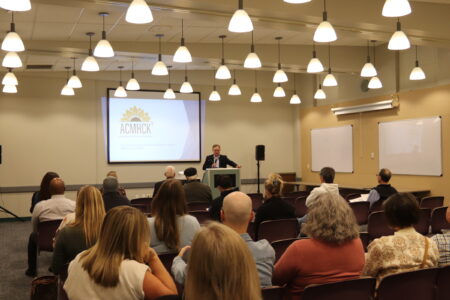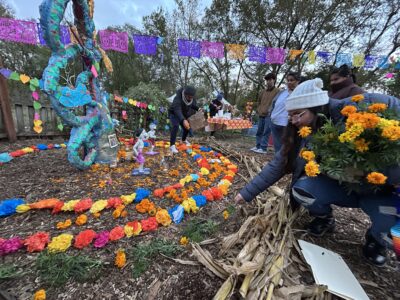Douglas County commissioners to weigh child care scholarship initiative to support working families

photo by: Journal-World
The west side of the Douglas County Courthouse, 1100 Massachusetts St.
Douglas County commissioners will consider awarding money to a plan for a child care scholarship fund on Wednesday to help more low- and moderate-income families afford child care.
The goal is to help more working families – or those who want to enter the workforce – access child care scholarships for children under age 6. The county commissioners have included $100,000 in the 2026 budget for what is now dubbed the “Douglas County Community Child Care Scholarship Challenge Fund.” The initiative’s purpose is to encourage additional donations from businesses, organizations and individuals to donate funds toward child care scholarships for county families.
Positive Bright Start, a nonprofit with a long history of supporting early childhood education in the county through its own scholarships, will manage the scholarship program. The organization has existing partnerships with child care providers in the county to provide these scholarships at the Ballard Community Center, Children’s Learning Center, Raintree Montessori School, Positive Bright Start’s Positive Behavior Support Classroom, Googols of Learning, Edna A. Hill Child Development Center, Brown Like Me and Lawrence Community Nursery School.
The challenge fund aims to increase donor involvement and create long-term sustainability for the scholarship program. The county will match contributions of $10,000 or more, dollar for dollar, up to a $100,000 cap. The goal is to raise $100,000 in new donations between January and December 2026.
Jill Jolicoeur, assistant county administrator, told the Journal-World via email that scholarship amounts are based on a family’s income and the child’s age. Positive Bright Start uses a specific chart to decide how much tuition assistance a family qualifies for. The scholarship does not cover the full cost of monthly tuition. Families are responsible for paying the remaining balance, often called a “family fee,” which varies depending on the school’s tuition rates and the child’s age.
For example, if a family of three earns $22,000 per year and has a 4-year-old attending school full-time at the Children’s Learning Center, they may receive $700 per month in scholarship funds as the school charges $890 per month. The family would need to pay the remaining $190 themselves.
Jolicoeur said that in the past few years, $75,000 has been able to provide a partial monthly tuition scholarship to approximately 20 children. She said it could be projected that $100,000 would serve 25, and $200,000 would serve 50, but this is just speculation based on past data.
The effort also seeks to lower the current scholarship waitlist. Currently only 45% of eligible applicants for scholarships are being served. The memo said PBS already has the staff and infrastructure in place to manage the funds, meaning all donations go directly to scholarships rather than administrative costs.
As the Journal-World reported, a fund to match up to 33.3% of the current available child care slots in the county for children under the age of 6 was included in the anti-poverty focus area of the Community Health Improvement Plan, which is a five-year roadmap to improve community health, and this initiative is to complete this strategy in the plan.
Child care organizations throughout Douglas County have submitted letters supporting the community-wide scholarship fund. Marie Taylor, executive director of Positive Bright Start, said in a letter to commissioners that the organization has witnessed improved kindergarten readiness because of the early education environments children participated in after receiving a scholarship.
Kim Polson, executive director of the Community Children’s Center, said in a letter that securing and paying for high-quality child care is a significant barrier to family stabilization for the almost 5,000 children in Douglas County with parents in the labor force.
“Supplemental support of childcare costs is a critical component in creating pathways out of poverty and a catalyst for breaking generational cycles,” Polson said in the letter. “The requested funding will lay the groundwork for a broader conversation about the need for community investment in the early childhood infrastructure in Douglas County.”
In other business, county commissioners will:
• Consider a new set of procedures for evaluating and awarding funding from the Municipalities Fight Addiction Fund and the Special Alcohol Fund to community partners. During the 2026 budget deliberations, county commissioners were interested in understanding how each fund can be used, the difference between the funds and creating a methodology for distributing funding.
According to a memo in the agenda, the Municipalities Fight Addiction Fund currently has a balance of $476,195. These funds must be used only for approved purposes by the state, such as naloxone distribution, medication-assisted treatment, prevention programs, recovery initiatives and more. Additionally, the county’s Special Alcohol Fund is supported by liquor taxes and currently holds $246,873. This fund also supports local substance abuse prevention and treatment efforts.
The funding application process has two annual submission cycles: April 15 and December 15. April applications are evaluated for inclusion in the annual budget, with decisions made by early June, while December applications are reviewed within 90 days for potential mid-year funding. Only agencies with an existing agreement with the county are eligible for the December cycle.
• Consider approving the 2026 service agreement with changes made by county staff. According to a memo in the agenda, service agreements are used for community partner funding over $80,000, while agreements under that are known as community partner agreements. Partners receiving funding through a service agreement must submit invoices on a monthly or quarterly basis to be reimbursed for the services they have provided.
County staff conducted a review of the 2026 service agreement to clarify existing practices, enhance accountability and align agreement language with current procedures, the memo said.
• Consider waiving finance policies to allow the Douglas County Emergency Communications director to sign an agreement with HCI Energy to purchase replacement power modules for all four radio towers. Each module costs $32,200. The current modules, installed in 2013, have reached end-of-life and are no longer available. Purchases over $100,000 are typically required to go through a competitive bidding process under the county’s finance policy, but commissioners will consider waiving that requirement.
The County Commission’s business meeting will begin at 5:30 p.m. Wednesday in the Douglas County Commission meeting room at 1100 Massachusetts St. The meeting will also be available via Zoom.







